Meet the Souvlaki Wrapper Who’s Served Athens for...
Discover how Christos, Athens’ master souvlaki...
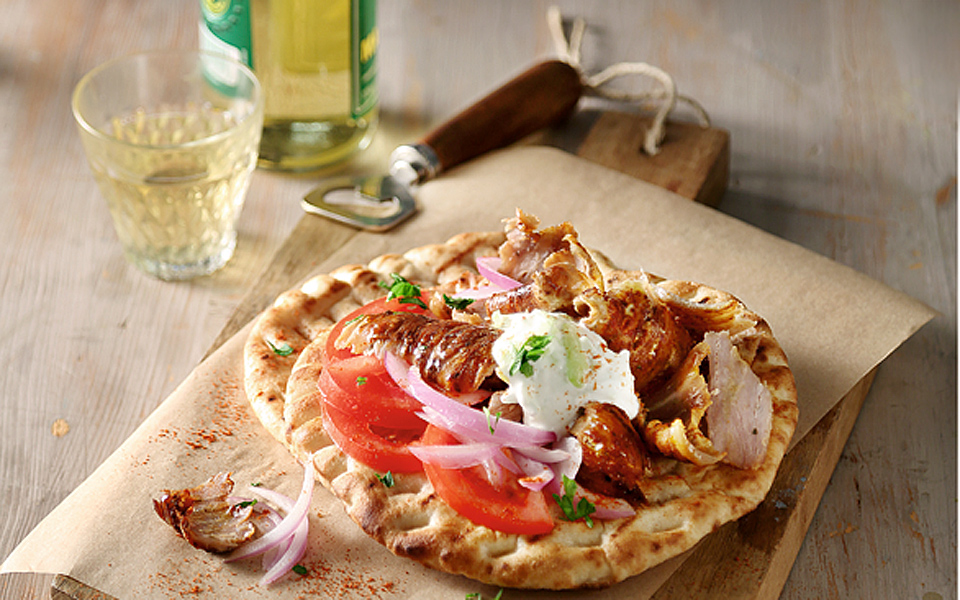
Traditional souvlaki and a glass of good retsina: the perfect match.
© George Drakopoulos | Food Styling: Tina Webb
This is the epitome of Greek street food: a grilled flatbread (pita) wrapped around a juicy kebab – finely chopped spit-roasted pork or chunks of pork or chicken grilled on a skewer – with a dollop of yogurt and garlic sauce (tzatziki), and a few slices of fresh tomato. Greeks usually get a souvlaki to go and rarely accompany it with wine, as beer is the more popular option. However, sommelier Nikolas Giannopoulos believes that “a modern retsina, of medium aromatic strength – elegant, herbal and spicy – will subdue the grease in the dish and interact with the pungent flavors of the onion and garlic to lead to a refreshing and playful aftertaste, in perfect harmony.”
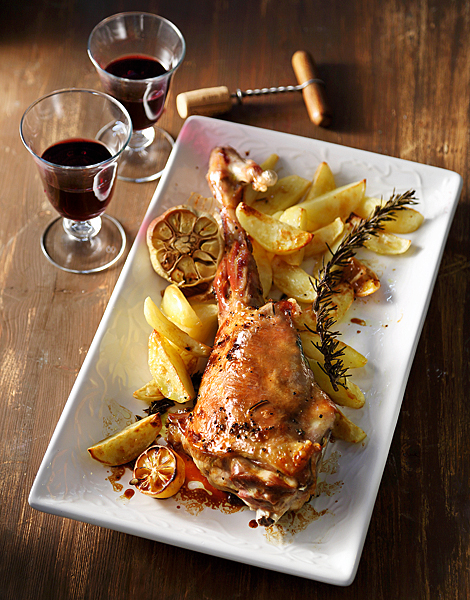
Xinomavro is a classic choice for spit-roasted lamb.
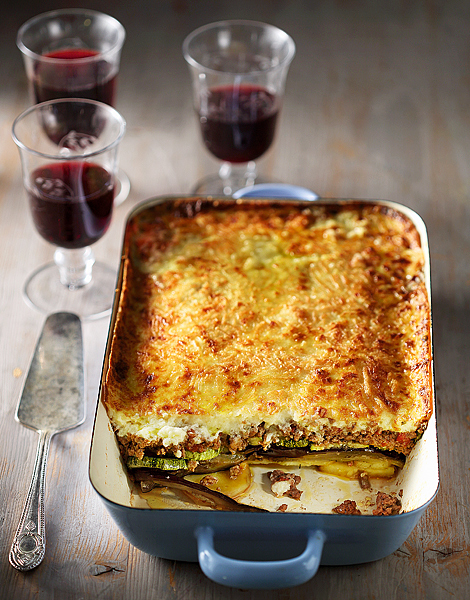
Moussaka, a favorite family Sunday food, would pair well with a young Xinomavro.
Lamb and goat are both flavorsome meats and particular favorites with Greeks, who usually serve them on special occasions, either baked in the oven with potatoes, in a fricassee stew with wild greens, or as grilled ribs. But the most popular preparation, reserved for festive feasts and particularly Easter, is on the spit. Generously salted and rubbed with garlic, oregano and lemon, the entire animal is attached to a long metal spit and slow-roasted over a charcoal fire to acquire a crispy skin and juicy, richly flavored meat. “Xinomavro is a classic choice, as its acidity and fruity notes counterbalance the richness of the meat. Alternatively, I would recommend a Limniona,” says oenologist Marianna Makrigianni.
A majestic comfort food and staunch favorite for a family Sunday lunch, moussaka is “constructed” with layers of fried or roasted sliced eggplant or zucchini and potato, covered in minced beef sauce and then topped with a thick blanket of white sauce. It is richer and heavier than pastitsio, in which the vegetables are replaced with bucatini pasta. “Such complex dishes prefer wines that play a back-up role, with very mild tannins and pleasant fruits, like a fresh Agiorgitiko. If you’re looking for something more obscure and interesting, try a mature Limnio with round, soft tannins,” says chef Manos Zournatzis. “Moussaka demands a red, with a charming flavor imprint and a dynamic character, like a young Xinomavro,” adds Maria Dimou.
• Maria Dimou | Sommelier and PR manager at Katogi & Strofilia vineyards
• Athanase Fakorellis | Consultant Oenologist
• Nikolas Giannopoulos, AIWS | Named Best Sommelier of Greece in 2011, 2012 and 2014, and managing director of Oenophorum Luxury Hospitality Services
• Chryssa Giatra | Oenologist, wine consultant
• Yiannis Kaimenakis | Sommelier
• Maria Katsouli | Head sommelier and olive oil expert
• Ted Lelekas | Vice-president of the International Federation of Wine and Spirit Journalists and Writers (FIJEV)
• George Loukas | Sommelier, founder of the Genius in Gastronomy seminar and consultancy firm
• Nikos Loukakis | Wine and food consultant
• Marianna Makrigianni | Oenologist, AIWS of the Wine & Spirit Professional Center (WSPC) in Athens
• Sofia Perpera | Director of the Greek Wine Bureau in North America
• Manos Zournatzis | Chef, co-owner of Cookoovaya restaurant in Athens
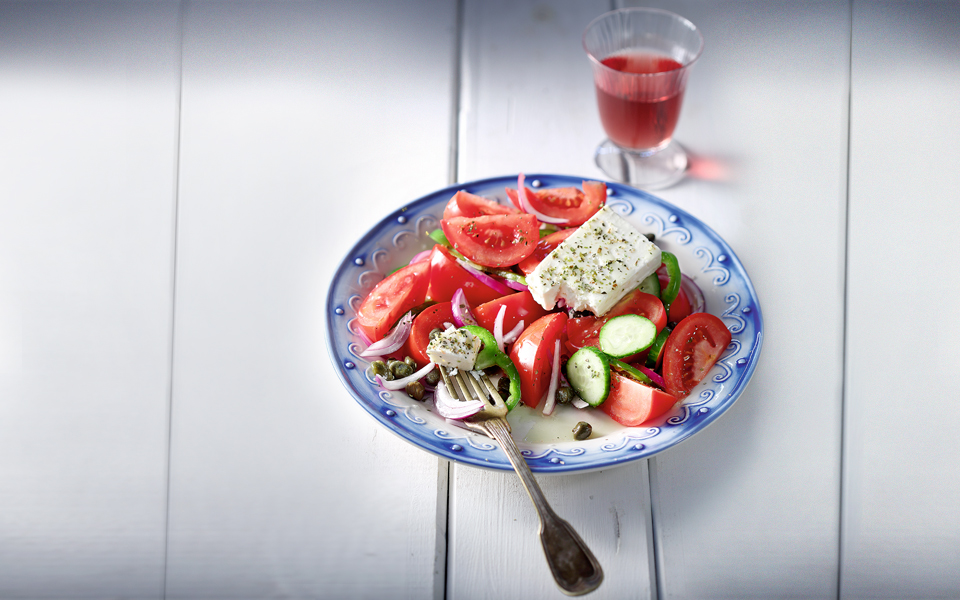
Greek Horiatiki salad: bitter-sweet rosés are considered a perfect match.
One of the most popular salads in the world, it is made with sweet summer tomatoes, olives, sliced onion and cucumber, and may be enriched with other delights like capers, arugula (or rocket), oregano, purslane, etc – always with high-quality, extra-virgin olive oil and a generous slab of feta cheese. As it is based on tomato, bitter-sweet rosés are considered a perfect match, and so too are fragrant whites. Maria Katsouli recommends “Assyrtiko or Malagousia, in a single-variety or blended wine, where the herbal aromas of the varieties create a dance of flavors with the components of the salad.” For Yiannis Kaimenakis, it would be equally interesting to try “a fresh rosé with accentuated acidity from any native variety.”
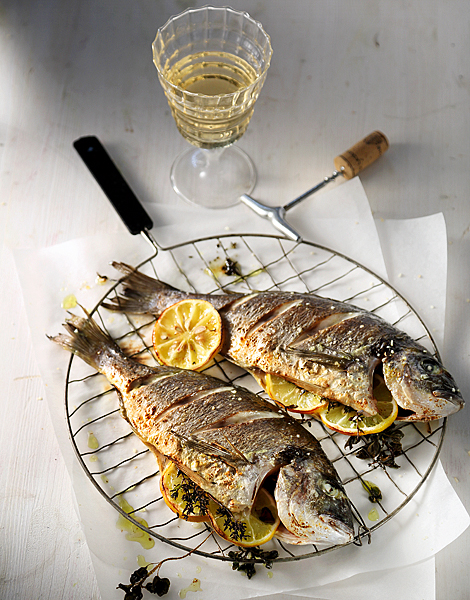
The general rule when it comes to fish is to avoid overly fragrant whites that will mask its flavor.

Αromatic and oily whites are a great choice for spinach pie, an all time classic Greek dish.
Fresh fish is the star of Greek cuisine: a first-rate ingredient showcased in its pristine simplicity with just a simple sauce of high-quality olive oil, fresh lemon juice, rock salt and, occasionally, a measured sprinkling of dried oregano. The general rule when it comes to fish is to avoid overly fragrant whites that will mask its flavor. When it is grilled, moreover, you want the body lent by barrel-aging, while acidity is also more than welcome. George Loukas recommends “an Assyrtiko that has spent some time in a barrel, preferably not from the Santorini area, so that the variety’s characteristic acidity and only slightly fruity notes are allowed to come forth and pair with the briny qualities of the juicy flesh. Save the unbarreled Santorini Assyrtiko for grilled sardines, roe dip and other such dishes with more intensity.” Nikos Loukakis agrees, adding that “big fish want whites that are full in body and alcohol content, and with the discreet presence of the barrel, such as Crete’s Vidiano.”
Spinach pie is an all-rounder for Greeks, served at formal dinners, regular family meals, for breakfast or as a snack on the go. In this dish, crispy filo pastry, lightly greased with olive oil and sometimes topped with a sprinkling of sesame seeds, embraces a rich filling of spinach, dill, beaten eggs, spring onion and – usually – feta cheese. To bring out the filling’s creamy texture and elevate the flavors, choose aromatic and oily whites. “Wines with refreshing acidity and a bold aromatic character with notes of flowers and spices, like Moschofilero or a Roditis blend, are just the thing for spinach pie,” says Maria Dimou.
Discover how Christos, Athens’ master souvlaki...
As Greeks gather for their Tsiknopempti...
The Thessaloniki-born winemaker welcomes us to...
Between Strefi and Lycabettus Hills, Neapoli...